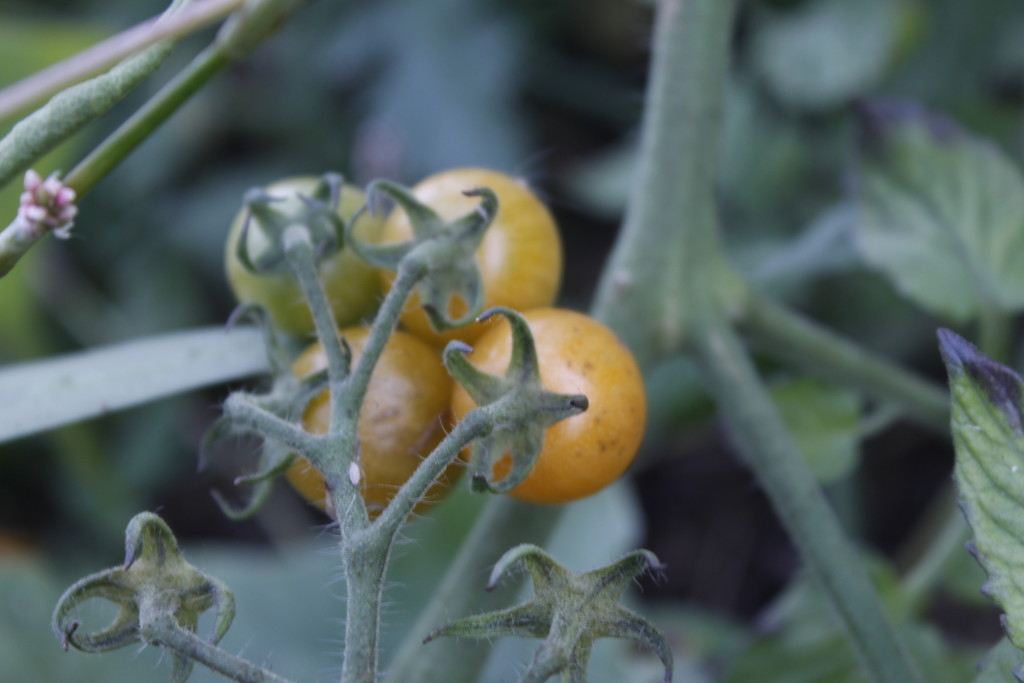
I’m not a huge fan of the caterpillar holes in my kale, the little green turds that the caterpillars leave, or the sight of their fat, green bodies crawling around the leaves as they chew out sections.
I pluck the leaves anyway, washing them thoroughly before I chop them into my stir-fry.
I’m such a half-assed gardener.
I take my bike out in the morning, peddling over to the greenhouse that my neighbor built, fill watering cans in the rain-barrels and wave them recklessly over the tumbled greenery. If I should cross an unlucky caterpillar, I’ll crush it between my fingers. I acknowledge the invasive Canada thistle and the inroads that it has made among the useful plants. I should take care of that before it gets out of hand.
Two-thirds of the greenhouse is actually weeds. My neighbor, who set up most of the infrastructure I’m using, is taking a year off from organic farming so that he can catch up with other business commitments. I have commitments too: to work, to the ultra marathon training earlier this summer, as well as my recreation and leisure time. The latter can be demanding.
Hence, I’d thought it wise not to try and take the entire greenhouse under my management. The weeds get their portion and I work to make a decent garden out of mine.
Maintaining a small empire allows me to improve on domestic policy rather than wage costly (in effort) foreign wars on the weeds outside my borders. I provide my subjects with water, pruning and some weeding and insect pulling. I tax them by harvesting their leaves and fruit.
I walk among the ranks of kale when I get back from work in the early evening.
If my garden were Dubai, the kale would be the oil coming out of the ground. It keeps on giving. I’d emptied out the entire packet of kale seeds at the start of the season when I figured that this would be the best way to make sure that something grew. Also, I don’t mind eating kale all the time. In fact, I eat it almost every night.
Behind the kale in productivity, I have my cherry tomatoes, which add color and panache to my cooking. The fruit grows in orange clusters — and I’m not just using the technical sense of the word when I call it fruit. It is deliciously sweet, the way an orange or apricot is sweet, but in its own tomato-y way. I’ll eat them off the vine, or put them in a stir-fry, leaving them whole in the frying pan to trap the flavor beneath the skin.
The peppers are small and few, an occasional treat. Small cantaloupes and muskmelons fatten on the vine.There were about a dozen ears of sweet corn also. Not the best yield by Monsanto’s standards, indeed not a great yield for the standards a dedicated gardener, but for I’ll take what I have.
It can be hard to find the chance to tend garden when you live life on the move. Because I rent in this state, haven’t been here long, and plan to move again soon, it is hard to motivate myself to build soil beds, erect fences, or undertake any such long-range improvements that can only benefit me for one season.
If I stayed in one place, I could allow improvement to build upon improvement. The work put into bettering the soil one year can improve yields for years to come.
On the flip side, it is harder to build on success when you are starting over each season. There are the many hours of repeat work that goes into new fencing, new pots, new work clearing a plot of land for planting. The gardener who stays rooted in one place has more time to learn the challenges and character of the land.
The rooted gardner is also in a better position to comment about the changing environment. Such people have an investment to protect. They develop what naturalist Aldo Leopold describes as a “Land Ethic,” wherein farmers, hunters and gatherers learn to protect the land not only because they profit from it, but of the love they develop for it over time. That relationship drives them to stay and fight where others would look for new soil to dig up.
It is easy for rooted folks to distrust the drifter, someone who could chop down the family orchard for a quick buck, and move on to the next venture.
Now, more than ever, our money and our sense of gratification, move at light speed. A package from Amazon arrives far quicker than the time it takes a flower to become a fruit. We can reward ourselves with a thousand clicks online with less effort than it takes to cook dinner.
I realize, though I loathe admitting it, that this impatience is very much a part of me. Many times, when I was digging the ground or putting seeds in, I wondered if I would get distracted by something and let the garden fall by the wayside.
It was the sight of those first green shoots pushing up through the dirt that built my commitment. If I neglected the garden then, I would be failing the life that I had propagated. I needed to keep it around long enough so I could eat it.
One blessing I found in the garden, was that the plants I’d put in the ground had their own interest in being alive. As the plants began asserting themselves, I had less work to do. Perhaps, I had put the kale seedlings a little closer together than ideal for growth, but this helped crowd out the weeds.
And eventually, even my half-assed gardening yielded food, mostly the kale, which has come in fast enough so that I can eat it every night. And why not? It tastes great in stir-fry, it’s healthy, and a few bug holes don’t ruin it.
Fresh veggies are expensive here in Northeast Minnesota. Taking this one expensive item off my grocery list has saved me hundreds of dollars without compromising healthy eating. The cherry tomatoes, which develop quicker than full-sized ones, are a nice investment too. If one cherry tomato goes bad, it’s far less of a loss, than if it had been a beefsteak.
Which isn’t to say that I don’t think about how much more the garden could have given if I’d put more time into it. The other day, I helped tend a garden at a nearby home where potatoes, beets and onions grew in abundance. Such root vegetables, seemed like a pretty good investment for a small amount of time.
I can look at that well-manicured garden and think, “good job,” reflecting that hard work was rewarded in kind by nice yields. Those fruits are worth more than mine, because they were tended with an abundance of love, focus and dedication.
My garden could be a parable of human failure, how our throwaway society has instilled in us the fallacy of expecting much reward for little work. But I am in no mood to expound upon the garden I don’t have. The treasures from the real garden, however modest, motivate me better. It is a lazy yield, but it is my own. Therefore, I will take that bite of caterpillar-damaged kale, stir-fried with cherry tomato, and I’ll think, “Not bad.”
